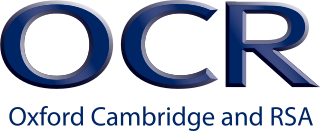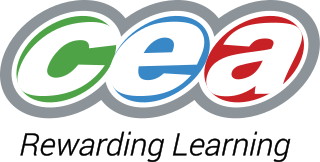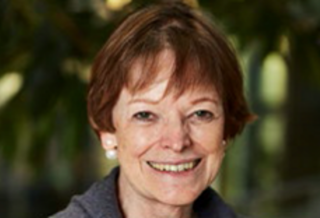The General Certificate of Secondary Education (GCSE) is an academic qualification in a range of subjects taken in England, Wales, and Northern Ireland, having been introduced in September 1986 and its first exams taken in 1988. Public schools in Scotland use the Scottish Qualifications Certificate instead. However, private schools in Scotland often choose to follow the English GCSE system.

The Qualifications and Curriculum Development Agency (QCDA), previously known as the Qualifications and Curriculum Authority (QCA), was a charity, and an executive non-departmental public body (NDPB) of the Department for Education. In England and Northern Ireland, the QCDA maintained and developed the National Curriculum and associated assessments, tests and examinations, advising the minister formerly known as the Secretary of State for Education on these matters.

AQA Education, trading as AQA, is an awarding body in England, Wales and Northern Ireland. It compiles specifications and holds examinations in various subjects at GCSE, AS and A Level and offers vocational qualifications. AQA is a registered charity and independent of the government. However, its qualifications and exam syllabi are regulated by the Government of the United Kingdom, which is the regulator for the public examinations system in England and Wales.

Edexcel is a British multinational education and examination body formed in 1996 and wholly owned by Pearson plc since 2005. It is the only privately owned examination board in the United Kingdom. Its name is a portmanteau term combining the words education and excellence.

Oxford, Cambridge and RSA Examinations (OCR) is an examination board that sets examinations and awards qualifications. It is one of England, Wales and Northern Ireland's five main examination boards.

The Council for the Curriculum, Examinations & Assessment (CCEA) is an awarding body in Northern Ireland. It develops and delivers qualifications, including GCSEs, AS, and A Levels, and provides curriculum support and assessments for schools. CCEA is a non-departmental public body and regulator, approving and monitoring Awarding Organisations offering qualifications in Northern Ireland.

WJEC is an examination board providing examinations, professional development and educational resources to schools and colleges in Wales and Northern Ireland under its own name, and the Eduqas brand for England.

The International General Certificate of Secondary Education (IGCSE) is an English language based secondary qualification similar to the GCSE and is recognised in the United Kingdom as being equivalent to the GCSE for the purposes of recognising prior attainment. It was developed by Cambridge Assessment International Education. The examination boards Edexcel, Learning Resource Network (LRN), and Oxford AQA also offer their own versions of International GCSEs. Students normally begin studying the syllabus at the beginning of Year 10 and take the test at the end of Year 11. However, in some international schools, students can begin studying the syllabus at the beginning of Year 9 and take the test at the end of Year 10.
The Certificate of Secondary Education (CSE) was a subject-specific qualification family awarded in both academic and vocational fields in England, Wales and Northern Ireland. CSE examinations were held in the years 1965 to 1987. This qualification should not be confused with the Indian Certificate of Secondary Education which is a school-leaving qualification in India. Also, in some African and former British colonial countries there is a qualification named the Certificate of Secondary Education based on the original and former British variant. Also, the CSE should not be confused with the African qualification CSEE.

The National Examination Board in Occupational Safety and Health is a UK-based examination board offering qualifications in health, safety, environment and wellbeing management.
Examination boards in the United Kingdom are the examination boards responsible for setting and awarding secondary education level qualifications, such as GCSEs, Standard Grades, A Levels, Highers and vocational qualifications, to students in the United Kingdom.
The A-level is a main school leaving qualification of the General Certificate of Education in England, Wales, Northern Ireland, the Channel Islands and the Isle of Man. It is available as an alternative qualification in other countries, where it is similarly known as an A-Level.
The Joint Council for Qualifications (JCQ) is a community interest company acting as a single voice for the eight largest qualification providers in the United Kingdom offering GCSE, GCE, Scottish Highers and vocationally related qualifications: AQA, CCEA, City & Guilds, Edexcel, NCFE, OCR, SQA and WJEC. The JCQ closely monitors examination administration, invigilation of exams at individual schools as-well as activities of exams officers.
The Joint Matriculation Board of the Universities of Manchester, Liverpool, Leeds, Sheffield and Birmingham (JMB), sometimes referred to as the Northern Universities Joint Matriculation Board, was an examination board, operating in England, Wales and Northern Ireland between 1903 and 1992. It became part of NEAB, which itself is now part of AQA.

Dame Glenys Jean Stacey DBE is a solicitor and civil servant serving as chair of the Office for Environmental Protection from February 2021. She was Chief Executive and Chief Regulator of Ofqual, acting in the post from August to December 2020, and previously from 2012 to 2016. Stacey also served as Her Majesty's Chief Inspector of Probation and led HM Inspectorate of Probation for England and Wales from 2016 and 2019.
The national qualification frameworks in the United Kingdom are qualifications frameworks that define and link the levels and credit values of different qualifications.

The Southern Examining Group (SEG) was an examination board offering GCSEs in England, Wales and Northern Ireland formally established in 1987. In 1994, it was taken over by the Associated Examining Board, but kept its own identity until the AEB merged with NEAB to form AQA in 2000.

Kathleen Tattersall was a British educationalist, specialising in examination administration. She was the leader of five examination boards in the United Kingdom before becoming the first head of exams regulator Ofqual.
Due to the COVID-19 pandemic in the United Kingdom, all secondary education examinations due to be held in 2020 were cancelled. As a result, an alternative method had to be designed and implemented at short notice to determine the qualification grades to be awarded to students for that year. A standardisation algorithm was produced in June 2020 by the regulator Ofqual in England, Qualifications Wales in Wales, Scottish Qualifications Authority in Scotland, and CCEA in Northern Ireland. The algorithm was designed to combat grade inflation, and was to be used to moderate the existing but unpublished centre-assessed grades for A-Level and GCSE students. After the A-Level grades were issued, and after criticism, Ofqual, with the support of HM Government, withdrew these grades. It issued all students the Centre Assessed Grades (CAGs), which had been produced by teachers as part of the process. The same ruling was applied to the awarding of GCSE grades, just a few days before they were issued: CAG-based grades were the ones released on results day.

Sally Collier is a British civil servant and former head of the Office of Qualifications and Examinations Regulation (Ofqual). She also involved in negotiating changes to European Union rules governing public procurement.












